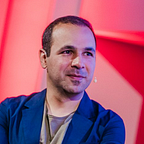Designing Intelligent Experiences
An IxD.ma workshop in collaboration with Google - September 2018.
This Fall http://ixd.ma/ teamed up with the Google AI team to explore the applications of Artificial Intelligence in everyday life. The goal of the 3-day long workshop was to develop concepts for a new level of intelligence for our devices. We conducted experiments on how to use AI and enhance our experiences.
Here are the results:
1.Google Ray of Life
Inspired by how AI is quickly being developed to better understand human emotions we set out to create something that would be useful for somebody going through depression. We wanted to explore how a device could generate a sense of companionship and also spark up human-human interactions. In this light, we played around with the device that would detect mood changes through the day and give suggestions according to that.
Whether it’s the suggestions on what to do to get better, in severe cases notifies a friend or reminds you of your best moments of the day before the sleep to grow your sense of gratitude.
Team: Tatiana Rubiano Goubert, Katre Purga, Kuo-Chih Lo (Mike)
2.Collective Experience AI
A Collective Experience AI device which tackles the problem of forgetfulness and difficulty of learning from past experiences
When in an unfamiliar situation it could be hard to recall similar experiences from the past and make rational decisions. AI could be a useful companion for humans to collect data about their day to day life and choices that influence it. Through a wearable smart device, it could give you the straight facts and share what others have done when faced with equivalent options. Help you to make better choices for yourself and thus alleviate unnecessary stress.
Team: Nesli Akbulut, Laura Grigorjan, Külliki Kesa, Villem Nilbe
3. Google Estate — AI-powered real estate agent
Homeownership is on the decline — especially among millennials, who no longer see their lives tied to a specific place for years. More people face the need to find a rental within a short timespan while being perhaps on the other side of the globe. During the Google AI workshop, we explored how to combine openly available information (temperature change, sun movement, noise level etc) with personalization through the aid of AI to develop a rental service that would help the globally mobile tenants find their next perfect crib.
Team: Epp Linke, Martin Rääk, Maria Jäärats, Roxana Macovei
4. Google Translate — Culture
Culture is a concept for Google Translate, in which a person can get cultural translation about products, currency conversion, and also contextual word suggestion during a voice conversation.
The core concept is to bring the Translate to a more seamless experience for a user in a foreign country. In one use case, the user can ask for the translation of a packaging and also get an advice if the product differs in characteristics, like flavor, compared to the same product in his home country so the user can feel more confident while shopping abroad. If the currency is unfamiliar, with a simple voice prompt, the user can get back the price converted into a currency he understands. The same device can use AI to listen and process conversation to suggest words when the user is missing a word in a conversation.
Team: Mike Ramos, Maret Kaadu, Sigrid Sitnikov, Lydia Petrova
5. Google Mood Tune!
A tool, that creates new music on a basis of music preferences of users connected to it. It goes through their music profiles and creates music that’s supposed to satisfy people with different tastes and fit the moment. The main goal of this tool is to make people feel comfortable while listening to music during a party or gathering. Mood Tune is not narrowing to any particular style or song. It lets people focus on communication and avoid situations when some people experience negative feelings towards music playing in the background.
Team: Tamara Borzova, Jorge Sebastian Delon Jimenez, Eerik Kändler, Madeleine Tults
5. Google life.
Idea 1: Petspeak, AI (and data on behavioral correlation) could help us speak with animals.
Idea 2: Public city guide, looks into idea how to impart your personal date temporarily to benefit from City AI.
Idea 3: Bodyguard tracks your health data and gives advice on your behavior
Idea 4: Vote for me! analyzes political landscape and gives advice based on your personal behavioral, ethical and lifestyle choices data.
Idea 5: Connected Coffee tracks your medical data and offers the corresponding choice from the vending machine.
Idea 6: Nanny — AI as a guardian angel for your kid.
Team: Jaak Parik, Marharyta Milovanova,Alexia Kraft de la Saulx, Tom Hartnell
Our Design approach
We practiced Hacking as a design approach. Hacking is based on finding solutions through the alteration of an existing product. This approach is different from the typical divergent and convergent thinking process that focuses on the investigation to find a solution.
Mentors
Amid Moradganjeh
Tim Wantland — Design Lead at Google
Markus Lippus — Co-founder at Mindtitan
